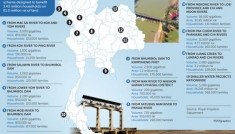Mekong Diversion Underway in Thailand | Phnom Penh Post
The Thai government’s planned diversion of billions of cubic metres of water from the Mekong River, described last week by a Thai Ministry of Water Resources representative as being as far as two years away, has already begun.
The pumping, which is pulling water from the Mekong and its tributaries into northern Thailand’s Huay Laung basin, began several days ago, according to Thai Royal Irrigation Department spokesman Thanar Suwattana.
While the move appears to be in possible defiance of international agreements, Suwattana insisted yesterday that, “This small amount will not make any impact on the water level.”
Depending on their scope and season, diversion projects need consultation or approval from other Mekong River Commission members, under MRC guidelines. But while Thai officials vowed to follow the guidelines, the MRC yesterday denied having received word.
“The MRC Secretariat has not received any notification that the Thai government wishes to divert water from the Mekong,” said Sopheak Meas, a communication officer with the MRC.
Thailand is experiencing its worst water shortage in more than a decade, according to its Royal Irrigation Department. The government’s response includes a $1.8 billion plan to divert rivers that form natural boundaries with Thailand.
As part of the plan, the government has been building sluice gates along one of the Mekong’s tributaries, as well as 30 “monkey cheek” reservoirs near the Mekong basin since last year. Thailand’s National Water Board approved the diversion plan in principle on January 12, but said it would still need an environmental impact assessment, which will apparently now be done after the fact.
The plan may also require consultation with Thailand’s fellow MRC members Cambodia, Laos and Vietnam.
During the wet season, diverting water within a basin requires a notification to the MRC joint council, and diverting water between two basins requires prior consultation with the council. During the dry season, intra-basin diversion requires consultation, and inter-basin diversion requires an agreement.
Suphot Tovichakchaikul, director of Thailand’s Department of Water Resources, said on January 13 that diversion efforts could be as long as two years away, pending the EIA and MRC negotiations.
Pianporn Deetes, of the NGO International Rivers, said that details of the diversion have been poorly shared with neighbouring countries who stand to lose any water Thailand keeps.
“As an MRC member, Thailand needs to consider its responsibility to . . . downstream countries in particular.”
Cambodian officials with the Foreign Affairs and Water Resources Ministries denied any knowledge of the project.



